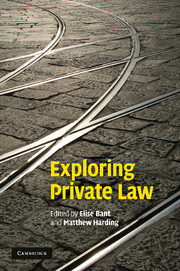Book contents
- Frontmatter
- Contents
- List of Contributors
- Foreword
- Acknowledgments
- Table of Cases
- Table of Legislation
- Introduction
- I Method
- II Unjust enrichment
- III Equity and trusts
- IV Remedies
- 16 The measurement of compensation claims against trustees and fiduciaries
- 17 Substitutability and disgorgement damages in contract
- 18 Unconscionability and proprietary estoppel remedies
- 19 Partial rescission: disentangling the seedlings, but not transplanting them
- 20 Of horses and carts: theories of indefeasibility and category errors in the Torrens system
- Index
- References
17 - Substitutability and disgorgement damages in contract
Published online by Cambridge University Press: 10 November 2010
- Frontmatter
- Contents
- List of Contributors
- Foreword
- Acknowledgments
- Table of Cases
- Table of Legislation
- Introduction
- I Method
- II Unjust enrichment
- III Equity and trusts
- IV Remedies
- 16 The measurement of compensation claims against trustees and fiduciaries
- 17 Substitutability and disgorgement damages in contract
- 18 Unconscionability and proprietary estoppel remedies
- 19 Partial rescission: disentangling the seedlings, but not transplanting them
- 20 Of horses and carts: theories of indefeasibility and category errors in the Torrens system
- Index
- References
Summary
The principles governing the award of disgorgement damages for breach of contract remain opaque. In the leading judgment in Attorney-General v Blake, Lord Nicholls proposed a ‘legitimate interest’ test for determining when a breach of contract would give rise to an account of profits. However, continuing uncertainty about what constitutes a legitimate interest has made the test notoriously difficult to apply. In that context, Lord Steyn's remark, that ‘[e]xceptions to the general principle that there is no remedy for disgorgement of profits against a contract breaker are best hammered out on the anvil of concrete cases’, simply highlights the need for concrete criteria to guide the enquiry. The fact remains that, nine years after Blake was decided, and notwithstanding numerous cases addressing the question, there is no settled judicial approach as to when disgorgement of profits will be awarded for breach of contract.
This chapter suggests that the concept of ‘substitutability’ is an important key to the enquiry which must be made by courts. Substitutability is already a criterion for the award of specific relief. But the way in which substitutability is applied to determine a plaintiff's right to disgorgement in different contexts needs to be nuanced. This chapter explains that, for what are here called the ‘second sale’ cases, the central question is whether the subject matter of the contract was substitutable. However, the chapter goes on to explain that for the so-called ‘agency problem’ cases, substitutability is not the only factor, although it remains relevant.
- Type
- Chapter
- Information
- Exploring Private Law , pp. 377 - 401Publisher: Cambridge University PressPrint publication year: 2010



